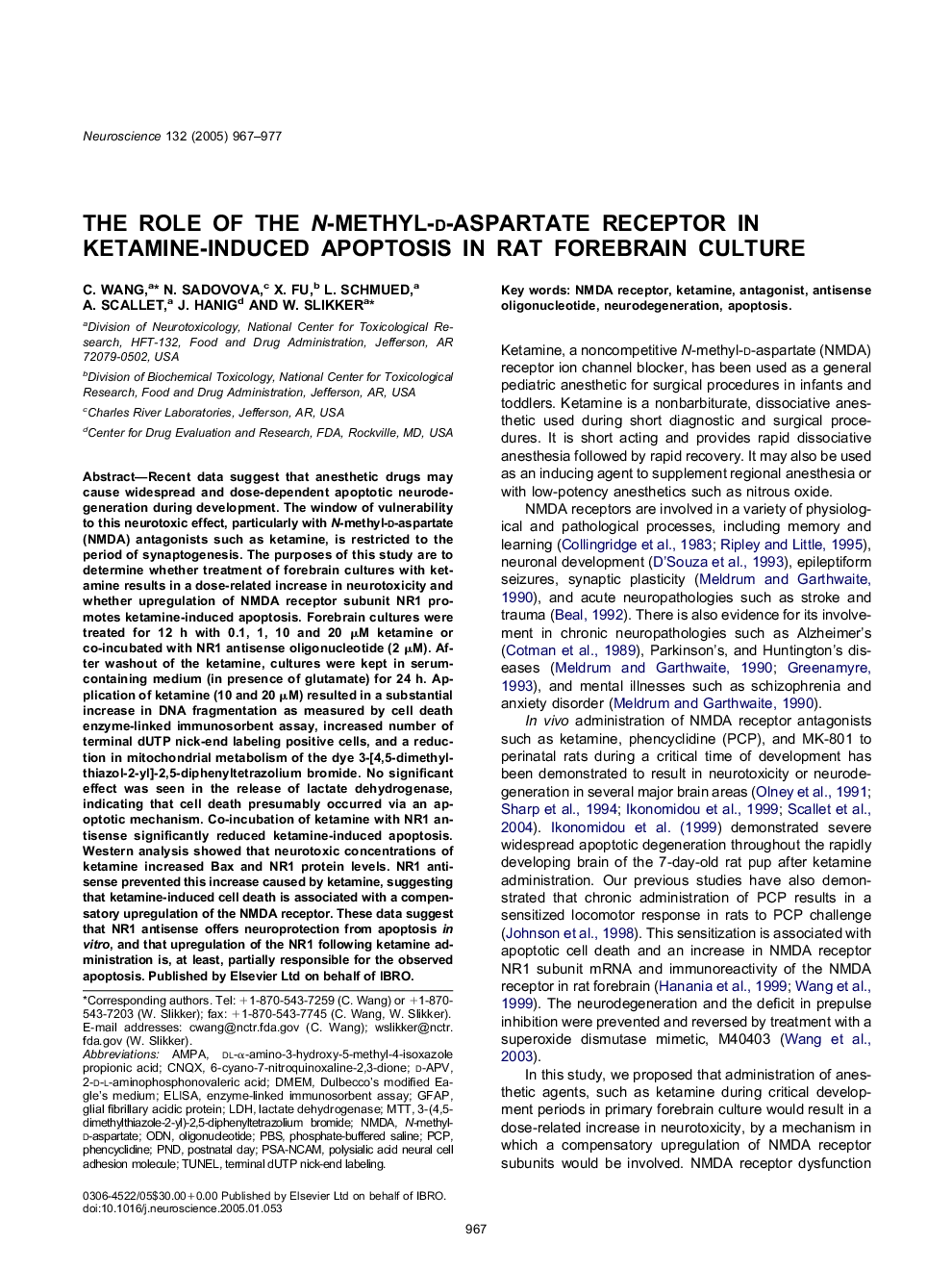| کد مقاله | کد نشریه | سال انتشار | مقاله انگلیسی | نسخه تمام متن |
|---|---|---|---|---|
| 9425873 | 1295896 | 2005 | 11 صفحه PDF | دانلود رایگان |
عنوان انگلیسی مقاله ISI
The role of the N-methyl-d-aspartate receptor in ketamine-induced apoptosis in rat forebrain culture
دانلود مقاله + سفارش ترجمه
دانلود مقاله ISI انگلیسی
رایگان برای ایرانیان
کلمات کلیدی
polysialic acid neural cell adhesion moleculeAMPAPSA-NCAMPCPNMDAPNDN-methyl-d-aspartateGFAPODND-APV3-(4,5-dimethylthiazole-2-yl)-2,5-diphenyltetrazolium bromideTerminal dUTP nick-end labelingDMEMPBS6-Cyano-7-nitroquinoxaline-2,3-dione - 6-Cyano-7-nitroquinoxaline-2،3-dioneMTT - MTTNMDA receptor - NMDA گیرندهantisense oligonucleotide - oligonucleotide antisenseAntagonist - آنتاگونیستOligonucleotide - اولیگونوکلئوتیدELISA - تست الیزاEnzyme-linked immunosorbent assay - تست الیزاNeurodegeneration - تولید نوروژنیکTUNEL - تونلApoptosis - خزان یاختهایpostnatal day - روز پس از زایمانCNQX - سیانکیوایکسPhencyclidine - فن سیکلیدین، گرد فرشتهlactate dehydrogenase - لاکتات دهیدروژناز LDH - لاکتات دهیدروژناز به صورت مختصر شده LDH Phosphate-buffered saline - محلول نمک فسفات با خاصیت بافریDulbecco’s modified eagle’s medium - محیط عقاب اصلاح شده DulbeccoGlial fibrillary acidic protein - پروتئین اسیدی فیبریلاسیون گلایالKetamine - کتامین
موضوعات مرتبط
علوم زیستی و بیوفناوری
علم عصب شناسی
علوم اعصاب (عمومی)
پیش نمایش صفحه اول مقاله

چکیده انگلیسی
Recent data suggest that anesthetic drugs may cause widespread and dose-dependent apoptotic neurodegeneration during development. The window of vulnerability to this neurotoxic effect, particularly with N-methyl-d-aspartate (NMDA) antagonists such as ketamine, is restricted to the period of synaptogenesis. The purposes of this study are to determine whether treatment of forebrain cultures with ketamine results in a dose-related increase in neurotoxicity and whether upregulation of NMDA receptor subunit NR1 promotes ketamine-induced apoptosis. Forebrain cultures were treated for 12 h with 0.1, 1, 10 and 20 μM ketamine or co-incubated with NR1 antisense oligonucleotide (2 μM). After washout of the ketamine, cultures were kept in serum-containing medium (in presence of glutamate) for 24 h. Application of ketamine (10 and 20 μM) resulted in a substantial increase in DNA fragmentation as measured by cell death enzyme-linked immunosorbent assay, increased number of terminal dUTP nick-end labeling positive cells, and a reduction in mitochondrial metabolism of the dye 3-[4,5-dimethylthiazol-2-yl]-2,5-diphenyltetrazolium bromide. No significant effect was seen in the release of lactate dehydrogenase, indicating that cell death presumably occurred via an apoptotic mechanism. Co-incubation of ketamine with NR1 antisense significantly reduced ketamine-induced apoptosis. Western analysis showed that neurotoxic concentrations of ketamine increased Bax and NR1 protein levels. NR1 antisense prevented this increase caused by ketamine, suggesting that ketamine-induced cell death is associated with a compensatory upregulation of the NMDA receptor. These data suggest that NR1 antisense offers neuroprotection from apoptosis in vitro, and that upregulation of the NR1 following ketamine administration is, at least, partially responsible for the observed apoptosis.
ناشر
Database: Elsevier - ScienceDirect (ساینس دایرکت)
Journal: Neuroscience - Volume 132, Issue 4, 2005, Pages 967-977
Journal: Neuroscience - Volume 132, Issue 4, 2005, Pages 967-977
نویسندگان
C. Wang, N. Sadovova, X. Fu, L. Schmued, A. Scallet, J. Hanig, W. Slikker,